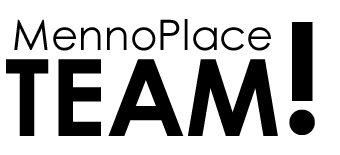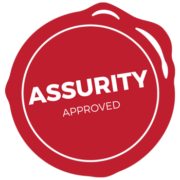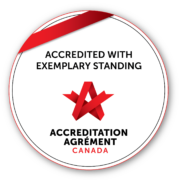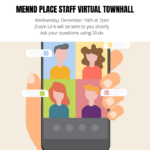Respiratory Protection for Health Care Workers in Long Term Care
Respiratory Protection for Health Care Workers in Long Term Care
The past 4 weeks have been a very challenging time for all of the health care workers on the Menno Place campus as both Home and Hospital were on full droplet precautions, requiring full PPE. There is no time in recent history that long-term care healthcare workers have been required to use PPE to this extent – it is new to all of us.
The spread of COVID among the staff in Menno Home E2 has highlighted questions about PPE, including whether or not we are protected when we wear the PPE we’ve been issued. Some have asked if we should be issued N95 masks for better protection when working on a COVID-positive unit.
Recently, an ICU specialist from St. Paul’s Hospital met with the Fraser Health Medical Directors for Long Term Care and shared that he is wearing a regular surgical mask and shield for his routine work in ICU where he consistently works with COVID-19 positive patients. This was brought to us by Dr. Dueck, our Medical Director, as we discussed the protection provided to healthcare workers with the regular surgical mask. ICU doctors and nurses only wear an N95 when a patient is ventilated and particles are aerosolized.
Although there is no harm in wearing a medical grade fitted N95 mask that is issued to you, there is no additional benefit, either, as we do not do these procedures in long-term care. Using a non-medical grade or unfitted N95 mask does pose a risk as it will not function as required for this environment and may result in greater risk to the wearer and provide less protection than the use of a surgical mask.
Available data indicates that COVID-19 spreads more like a common respiratory virus, primarily through respiratory droplet transmission within a short range (eg. Less than six feet). There is no evidence of efficient spread (ie: routine, rapid spread) to people far away or who enter a space hours after an infectious person was there. Surgical masks (the blue medical grade ones) are effective barriers for retaining large droplets which can be released from the wearer through talking, coughing, singing or sneezing. They protect the wearer from sprays, splashes and droplets. The contaminated N95 mask brings with it all the same opportunities for risk of contamination, particularly in doffing the mask after being in the presence of a COVID positive resident.
In the COVID positive unit, we have gone with the extended use of masks and goggles to decrease the numbers of times that PPE is changed and minimize the risk of contamination. We have increased our education and audits to promote personal and team confidence in effective use of PPE, enhanced cleaning, respiratory etiquette, donning and doffing and hand hygiene. We have practiced and supported each other with the help of two educators, Lada and Mike (Fraser Health). This encouragement and training has brought confidence and resulted in the slowing of the spread of the virus. This is the power of team working together! These are the infection control practices that, combined with proven PPE are effectively stopping the spread of COVID in Menno Home E2.
Sources of information:
https://www.ccohs.ca/oshanswers/prevention/respiratory_protection.html
https://www.cdc.gov/coronavirus/2019-ncov/more/scientific-brief-sars-cov-2.html
Dr. Dueck, Medical Director, Menno Home and Hospital



